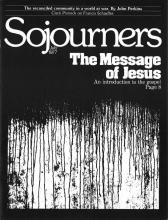A rather persistent pattern of criticism has emerged against Sojourners from a group of people suggesting that our commitment to the building of community signals a withdrawal from the world, that we are more concerned with an “alternative lifestyle” than with social justice, and that we are apolitical, or not political enough, or at least not political in the right ways. The explanation which is being offered for these manifold errors is that the Sojourners have become Anabaptists, and of course everyone knows how wrong the Anabaptists were.
The bulk of such criticism has come from a group of Reformed theologians and academics, most of whom are contributors to the Reformed Journal of
Read the Full Article

